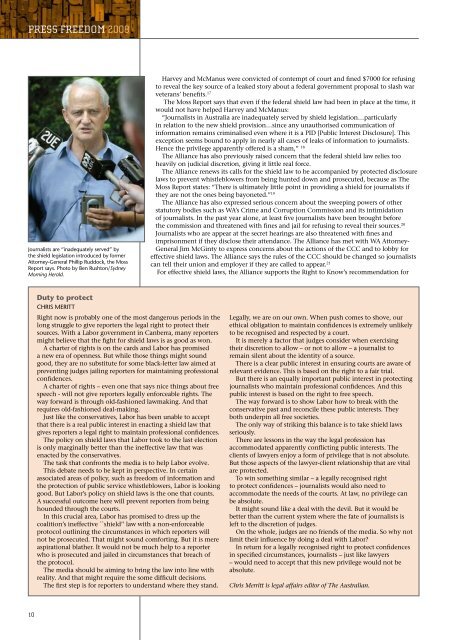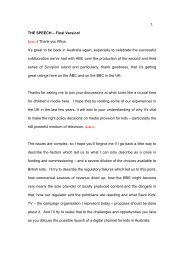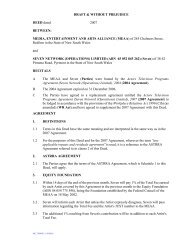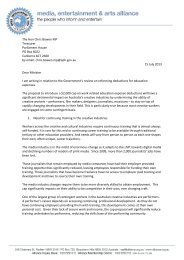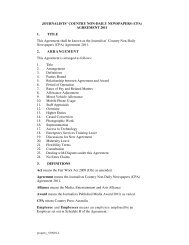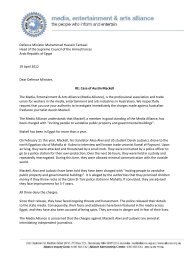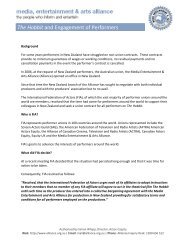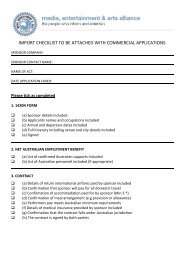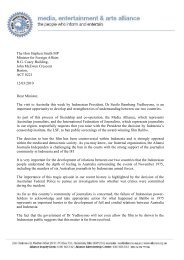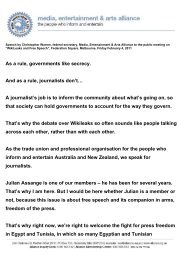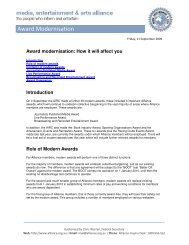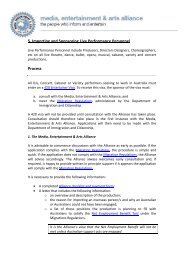Breaking the shackles - Media, Entertainment and Arts Alliance
Breaking the shackles - Media, Entertainment and Arts Alliance
Breaking the shackles - Media, Entertainment and Arts Alliance
You also want an ePaper? Increase the reach of your titles
YUMPU automatically turns print PDFs into web optimized ePapers that Google loves.
Journalists are “inadequately served” by<br />
<strong>the</strong> shield legislation introduced by former<br />
Attorney-General Phillip Ruddock, <strong>the</strong> Moss<br />
Report says. Photo by Ben Rushton/Sydney<br />
Morning Herald.<br />
Harvey <strong>and</strong> McManus were convicted of contempt of court <strong>and</strong> fined $7000 for refusing<br />
to reveal <strong>the</strong> key source of a leaked story about a federal government proposal to slash war<br />
veterans’ benefits. 17<br />
The Moss Report says that even if <strong>the</strong> federal shield law had been in place at <strong>the</strong> time, it<br />
would not have helped Harvey <strong>and</strong> McManus:<br />
“Journalists in Australia are inadequately served by shield legislation…particularly<br />
in relation to <strong>the</strong> new shield provision…since any unauthorised communication of<br />
information remains criminalised even where it is a PID [Public Interest Disclosure]. This<br />
exception seems bound to apply in nearly all cases of leaks of information to journalists.<br />
Hence <strong>the</strong> privilege apparently offered is a sham,” 18<br />
The <strong>Alliance</strong> has also previously raised concern that <strong>the</strong> federal shield law relies too<br />
heavily on judicial discretion, giving it little real force.<br />
The <strong>Alliance</strong> renews its calls for <strong>the</strong> shield law to be accompanied by protected disclosure<br />
laws to prevent whistleblowers from being hunted down <strong>and</strong> prosecuted, because as The<br />
Moss Report states: “There is ultimately little point in providing a shield for journalists if<br />
<strong>the</strong>y are not <strong>the</strong> ones being bayoneted.” 19<br />
The <strong>Alliance</strong> has also expressed serious concern about <strong>the</strong> sweeping powers of o<strong>the</strong>r<br />
statutory bodies such as WA’s Crime <strong>and</strong> Corruption Commission <strong>and</strong> its intimidation<br />
of journalists. In <strong>the</strong> past year alone, at least five journalists have been brought before<br />
<strong>the</strong> commission <strong>and</strong> threatened with fines <strong>and</strong> jail for refusing to reveal <strong>the</strong>ir sources. 20<br />
Journalists who are appear at <strong>the</strong> secret hearings are also threatened with fines <strong>and</strong><br />
imprisonment if <strong>the</strong>y disclose <strong>the</strong>ir attendance. The <strong>Alliance</strong> has met with WA Attorney-<br />
General Jim McGinty to express concerns about <strong>the</strong> actions of <strong>the</strong> CCC <strong>and</strong> to lobby for<br />
effective shield laws. The <strong>Alliance</strong> says <strong>the</strong> rules of <strong>the</strong> CCC should be changed so journalists<br />
can tell <strong>the</strong>ir union <strong>and</strong> employer if <strong>the</strong>y are called to appear. 21<br />
For effective shield laws, <strong>the</strong> <strong>Alliance</strong> supports <strong>the</strong> Right to Know’s recommendation for<br />
Duty to protect<br />
CHRIS MERITT<br />
Right now is probably one of <strong>the</strong> most dangerous periods in <strong>the</strong><br />
long struggle to give reporters <strong>the</strong> legal right to protect <strong>the</strong>ir<br />
sources. With a Labor government in Canberra, many reporters<br />
might believe that <strong>the</strong> fight for shield laws is as good as won.<br />
A charter of rights is on <strong>the</strong> cards <strong>and</strong> Labor has promised<br />
a new era of openness. But while those things might sound<br />
good, <strong>the</strong>y are no substitute for some black-letter law aimed at<br />
preventing judges jailing reporters for maintaining professional<br />
confidences.<br />
A charter of rights – even one that says nice things about free<br />
speech - will not give reporters legally enforceable rights. The<br />
way forward is through old-fashioned lawmaking. And that<br />
requires old-fashioned deal-making.<br />
Just like <strong>the</strong> conservatives, Labor has been unable to accept<br />
that <strong>the</strong>re is a real public interest in enacting a shield law that<br />
gives reporters a legal right to maintain professional confidences.<br />
The policy on shield laws that Labor took to <strong>the</strong> last election<br />
is only marginally better than <strong>the</strong> ineffective law that was<br />
enacted by <strong>the</strong> conservatives.<br />
The task that confronts <strong>the</strong> media is to help Labor evolve.<br />
This debate needs to be kept in perspective. In certain<br />
associated areas of policy, such as freedom of information <strong>and</strong><br />
<strong>the</strong> protection of public service whistleblowers, Labor is looking<br />
good. But Labor’s policy on shield laws is <strong>the</strong> one that counts.<br />
A successful outcome here will prevent reporters from being<br />
hounded through <strong>the</strong> courts.<br />
In this crucial area, Labor has promised to dress up <strong>the</strong><br />
coalition’s ineffective ``shield’’ law with a non-enforceable<br />
protocol outlining <strong>the</strong> circumstances in which reporters will<br />
not be prosecuted. That might sound comforting. But it is mere<br />
aspirational bla<strong>the</strong>r. It would not be much help to a reporter<br />
who is prosecuted <strong>and</strong> jailed in circumstances that breach of<br />
<strong>the</strong> protocol.<br />
The media should be aiming to bring <strong>the</strong> law into line with<br />
reality. And that might require <strong>the</strong> some difficult decisions.<br />
The first step is for reporters to underst<strong>and</strong> where <strong>the</strong>y st<strong>and</strong>.<br />
Legally, we are on our own. When push comes to shove, our<br />
ethical obligation to maintain confidences is extremely unlikely<br />
to be recognised <strong>and</strong> respected by a court.<br />
It is merely a factor that judges consider when exercising<br />
<strong>the</strong>ir discretion to allow – or not to allow – a journalist to<br />
remain silent about <strong>the</strong> identity of a source.<br />
There is a clear public interest in ensuring courts are aware of<br />
relevant evidence. This is based on <strong>the</strong> right to a fair trial.<br />
But <strong>the</strong>re is an equally important public interest in protecting<br />
journalists who maintain professional confidences. And this<br />
public interest is based on <strong>the</strong> right to free speech.<br />
The way forward is to show Labor how to break with <strong>the</strong><br />
conservative past <strong>and</strong> reconcile <strong>the</strong>se public interests. They<br />
both underpin all free societies.<br />
The only way of striking this balance is to take shield laws<br />
seriously.<br />
There are lessons in <strong>the</strong> way <strong>the</strong> legal profession has<br />
accommodated apparently conflicting public interests. The<br />
clients of lawyers enjoy a form of privilege that is not absolute.<br />
But those aspects of <strong>the</strong> lawyer-client relationship that are vital<br />
are protected.<br />
To win something similar – a legally recognised right<br />
to protect confidences – journalists would also need to<br />
accommodate <strong>the</strong> needs of <strong>the</strong> courts. At law, no privilege can<br />
be absolute.<br />
It might sound like a deal with <strong>the</strong> devil. But it would be<br />
better than <strong>the</strong> current system where <strong>the</strong> fate of journalists is<br />
left to <strong>the</strong> discretion of judges.<br />
On <strong>the</strong> whole, judges are no friends of <strong>the</strong> media. So why not<br />
limit <strong>the</strong>ir influence by doing a deal with Labor?<br />
In return for a legally recognised right to protect confidences<br />
in specified circumstances, journalists – just like lawyers<br />
– would need to accept that this new privilege would not be<br />
absolute.<br />
Chris Merritt is legal affairs editor of The Australian.


